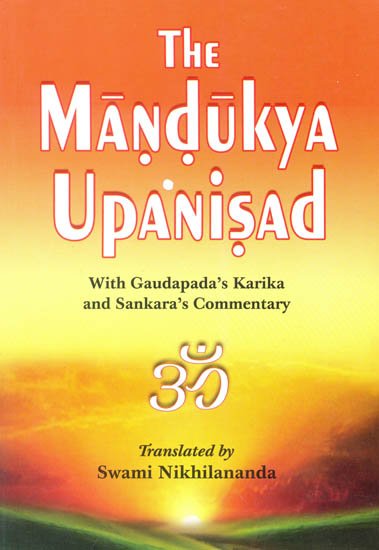Mandukya Upanishad (Gaudapa Karika and Shankara Bhashya)
by Swami Nikhilananda | 1949 | 115,575 words | ISBN-13: 9788175050228
This is verse 1.13 of the Mandukya Karika English translation, including commentaries by Gaudapada (Karika), Shankara (Bhashya) and a glossary by Anandagiri (Tika). Alternate transliteration: Māṇḍūkya-upaniṣad 1.13, Gauḍapāda Kārikā, Śaṅkara Bhāṣya, Ānandagiri Ṭīkā.
Mandukya Karika, verse 1.13
Sanskrit text, IAST transliteration and English translation
द्वैतस्याग्रहणं तुल्यमुभयोः प्राज्ञतुर्ययोः ।
बीजनिद्रायुतः प्राज्ञः सा च तुर्ये न विद्यते ॥ १३ ॥dvaitasyāgrahaṇaṃ tulyamubhayoḥ prājñaturyayoḥ |
bījanidrāyutaḥ prājñaḥ sā ca turye na vidyate || 13 ||13. The non-cognition of duality is common to both Prājña and Turīya. (But) Prājña is associated with sleep in the form of cause and this (sleep) does not exist in Turīya.
Shankara Bhashya (commentary)
This śloka is meant to remove a doubt that has arisen incidentally. The doubt is this: How is it that it is Prājña alone and not Turīya that is bound by the condition of cause, since the non-cognition of duality is the common feature of both? This doubt is thus removed1: The meaning of the phrase Bījanidrāyuta is: Nidrā or sleep is characterised by the absence of the Knowledge of Reality. This is the cause which gives rise to the cognition of varieties. Prājña is associated with this sleep which is the cause. It is because Turīya is ever all-seeing, therefore the sleep characterised by the absence of the Knowledge of Reality does not exist in Turīya. Therefore the bondage in the form of causal condition does not exist in Turīya.
Anandagiri Tika (glossary)
1 Removed—The contention that Turīya and Prājña are both characterised by the condition of cause on account of the common feature of the non-perception of duality in both the cases, is due to a wrong inference based upon insufficient data. The Prājña is thought to be the causal state because it is the immediately preceding condition of the manifestations of the waking state, etc. But this does not apply to Turīya because it is not the immediately preceding condition of any state. Turīya is not a state which is antecedent or subsequent to any other state. It is the substratum of all the states. Turīya is non-dual, changeless and pure consciousness itself. Hence it cannot be said to produce anything Therefore causal condition cannot obtain in the case of Turīya.
